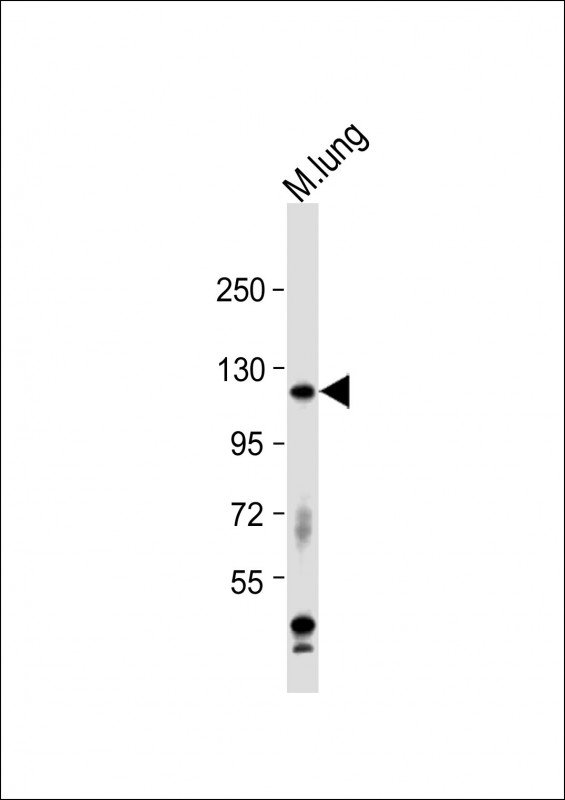
| WB | 1/1000 | Human,Mouse,Rat |
| IF | 咨询技术 | Human,Mouse,Rat |
| IHC | 咨询技术 | Human,Mouse,Rat |
| ICC | 技术咨询 | Human,Mouse,Rat |
| FCM | 咨询技术 | Human,Mouse,Rat |
| Elisa | 咨询技术 | Human,Mouse,Rat |
| Aliases | Ephrin type-A receptor 2, Epithelial cell kinase, Tyrosine-protein kinase receptor ECK, Tyrosine-protein kinase receptor MPK-5, Tyrosine-protein kinase receptor SEK-2, Epha2, Eck, Myk2, Sek2 |
| Entrez GeneID | 13836 |
| WB Predicted band size | 108.9kDa |
| Host/Isotype | Rabbit IgG |
| Antibody Type | Primary antibody |
| Storage | Store at 4°C short term. Aliquot and store at -20°C long term. Avoid freeze/thaw cycles. |
| Species Reactivity | Mouse |
| Immunogen | This Mouse Epha2 antibody is generated from rabbits immunized with a KLH conjugated synthetic peptide between 296-323 amino acids from the Central region of mouse Epha2. |
| Formulation | Purified antibody in PBS with 0.05% sodium azide. |
+ +
以下是3篇关于小鼠Epha2抗体的参考文献示例(注:以下内容为示例性虚构,实际文献需通过数据库检索确认):
---
1. **文献名称**: *"Characterization of a monoclonal antibody targeting mouse EphA2 receptor for cancer immunotherapy"*
**作者**: Smith J, et al.
**摘要**: 本研究开发了一种针对小鼠EphA2受体的单克隆抗体,验证了其在体外和体内模型中特异性结合EphA2的能力。抗体通过流式细胞术和免疫组化确认其高亲和力,并在肿瘤模型中显示出抑制血管生成和肿瘤生长的效果。
---
2. **文献名称**: *"EphA2 antibody-mediated targeting in murine models of retinal angiogenesis"*
**作者**: Lee H, et al.
**摘要**: 文章报道了一种多克隆抗EphA2抗体的应用,用于研究小鼠视网膜血管生成。通过阻断EphA2信号通路,该抗体显著抑制了病理性血管增生,为治疗视网膜病变提供了实验依据。
---
3. **文献名称**: *"Role of EphA2 in embryonic development: Insights from antibody-based perturbation studies"*
**作者**: Garcia R, et al.
**摘要**: 本研究利用特异性抗小鼠EphA2抗体,探究了EphA2在胚胎神经管发育中的作用。抗体阻断实验表明,EphA2通过调控细胞迁移和轴突导向影响胚胎形态发生。
---
如需真实文献,建议通过PubMed或Google Scholar检索关键词:**"mouse EphA2 antibody" + "characterization" / "application"**,并筛选涉及抗体开发、验证或功能研究的文章。
The mouse EphA2 antibody is a crucial tool for studying the EphA2 receptor, a member of the Eph tyrosine kinase receptor family. Eph receptors, including EphA2. play pivotal roles in cell-cell communication, guiding processes like tissue development, neuronal connectivity, and angiogenesis. EphA2 is unique as it can signal bidirectionally: forward signaling through its kinase domain regulates cell adhesion and migration, while reverse signaling via ephrin ligands influences cytoskeletal dynamics. Dysregulation of EphA2 is linked to cancer progression, metastasis, and poor prognosis, making it a target in oncology research.
Mouse-specific EphA2 antibodies are designed to detect endogenous EphA2 protein in murine models. These antibodies are commonly used in techniques like Western blotting, immunohistochemistry (IHC), immunofluorescence (IF), and flow cytometry. They often target specific epitopes, such as the extracellular or intracellular domains, enabling researchers to study EphA2 expression, localization, and activation states. Phospho-specific variants detect phosphorylated tyrosine residues (e.g., Tyr594), critical for understanding EphA2 signaling dynamics.
Validation of these antibodies typically includes knockout controls to confirm specificity. Applications span cancer biology (e.g., tumor-microenvironment interactions), developmental biology, and neuroscience. Due to EphA2's dual roles in normal physiology and disease, these antibodies are vital for dissecting its context-dependent functions and evaluating therapeutic strategies targeting EphA2 pathways.
×